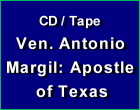Stories & Legends
 |
 |
 |
 |
 |
 |
 |
Miracles in the Crusades - 2
An Army from Heavens Assists
the Crusaders at Antioch
As we noted in the last article, when the Crusaders, under siege by the Turks in the recently conquered Antioch, were discouraged and suffering hunger,
a divine aid appeared with the discovery of the Holy Lance.
In his History of the Franks, eyewitness Raymond d'Aguiliers reports that not only did St. Andrew tell Peter Bartholomew where to find the Holy Lance, but he also instructed the Christians how they ought to conduct themselves before the battle and in the battle:
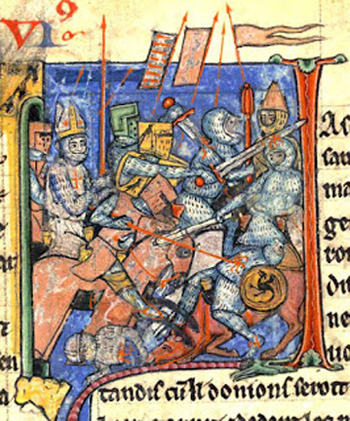 "You have all offended deeply, and you have been deeply humbled; and you have cried out to the Lord, and the Lord has heard you. And now let each one turn himself to the Lord because of his sins, and let him give five alms because of the Five Wounds of the Lord. If he cannot do this, let him say the Pater Noster five times.
"You have all offended deeply, and you have been deeply humbled; and you have cried out to the Lord, and the Lord has heard you. And now let each one turn himself to the Lord because of his sins, and let him give five alms because of the Five Wounds of the Lord. If he cannot do this, let him say the Pater Noster five times.
"When this has been done, begin battle in the name of the Lord by day or by night, as the judgment of the princes deems best, because the hand of God will be with you. If anyone has doubt of victory, let the gates be opened for him and let him go forth to fight the Turks, and he will see how their God will save him. Moreover, if anyone shall refuse to fight, let him be classed with Judas the betrayer of the Lord, who deserted the Apostles and sold his Lord to the Jews.
"Let them fight in the faith of St. Peter, holding in mind that God promised him that after the third day He would arise and appear to him, and for this reason also, because this land is justly St. Peter's and not the pagans.' And let your battle-cry be 'God help us!' and verily God will help you.
"All your brothers who died since the beginning of the expedition are present with you in this fight. You have only to storm the tenth part of the enemy, because they will assail nine parts in the might and command of God. And do not put off the battle because, if you do, the Lord will lead as many enemies from the other sides as you have on this side, and He will keep you shut up here until you devour one another [from hunger]."
The Battle of Antioch
The day of the fight was set for June 28. On that morning all partook of Communion and vowed to fight to the death for the glory of the Roman Church and the race of the Franks. The Holy Lance rode before them with the Bishop of Puy.
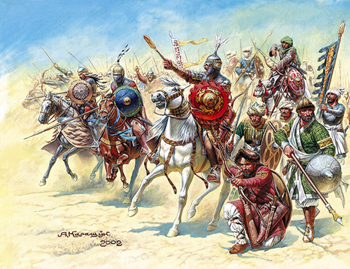 As they engaged in battle, the Turks inflicted many casualties, but this did not deter the crusaders: They saw an army led by three warrior saints – Sts. George, Demetrius and Mercurius – who came from the mountains and rode along with them. This fact is reported calmly and briefly in the account in the Gesta Francorum you will find below.
As they engaged in battle, the Turks inflicted many casualties, but this did not deter the crusaders: They saw an army led by three warrior saints – Sts. George, Demetrius and Mercurius – who came from the mountains and rode along with them. This fact is reported calmly and briefly in the account in the Gesta Francorum you will find below.
Another aid from Heaven was reported by Raymond d'Aguiliers in his Historia francorum qui ceperint Jerusalem (History of the Franks who took Jerusalem). He told about "a divine shower that Our Lord sent down upon all His army, little but full of blessing. All those touched by this water were filled with all grace and fortitude and, despising the enemy, rode forth no longer mindful of their hunger and weak state, but as if always nourished on the delicacies of Kings.
"This miracle also affected our horses no less. For what horse failed until the fight was over, even though it had tasted nothing except the bark or leaves of trees for eight days?"
He also reported that heavenly hosts entered the array, without, however, naming any specific Saints. He simply records: "God so multiplied our army that we, who before seemed fewer than the enemy, were in the battle more numerous than they."
In fact, the battle was brief and disastrous for the Turks who retreated in panic.
The Battle of Antioch as told in the Gesta Francorum
This excerpt about the defeat of Kerbogha comes from the Gesta Francorum, circa 1100-1101, written by an anonymous writer connected with Bohemund of Antioch.
At length, when the three days of fast had been fulfilled, and a procession had been held from one church to another, the crusaders confessed their sins, were absolved, and faithfully took the Communion of the Body and Blood of Christ; and when alms had been given they celebrated Mass.
Then, six battle lines were formed from the forces within the city:
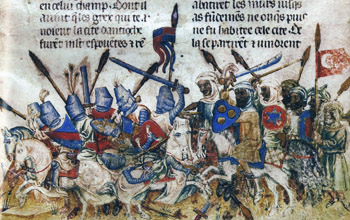 Our bishops, priests, clerics and monks, dressed in holy vestments, came out with us with crosses, praying and beseeching the Lord to make us safe, guard us and deliver us from all evil. Some stood on the wall of the gate holding the sacred crosses in their hands, making the Sign of the Cross and blessing us. Thus were we arrayed and, protected with the Sign of the Cross, we went forth through the gate that is before the mosque.
Our bishops, priests, clerics and monks, dressed in holy vestments, came out with us with crosses, praying and beseeching the Lord to make us safe, guard us and deliver us from all evil. Some stood on the wall of the gate holding the sacred crosses in their hands, making the Sign of the Cross and blessing us. Thus were we arrayed and, protected with the Sign of the Cross, we went forth through the gate that is before the mosque.
After Kerbogha saw the lines of the Franks, so beautifully formed, coming out one after the other, he said: "Let them come out, that we may the better have them in our power!"
But after they were outside the city and Kerbogha saw the huge host of the Franks, he was greatly frightened. He straightway sent word to his Emir that if he saw a light burning at the head of the army, he should have the trumpets sounded for retreat, for this would be the sign that the Turks had lost the battle.
Kerbogha immediately began to retreat little by little toward the mountain, and our men followed them little by little. At length the Turks divided: One party went toward the sea and the rest halted at the mountain, expecting to enclose our men between them. As our men saw this, they did likewise.
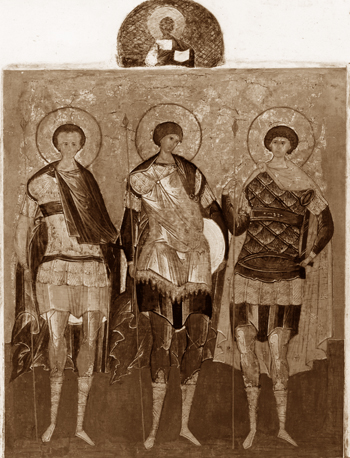 There a seventh line was formed from the lines of Duke Godfrey and the Count of Normandy, and its head was Reinald. They sent this line to meet the Turks who were coming from the sea. The Turks, however, engaged them in battle and killed many of our men by their shooting.
There a seventh line was formed from the lines of Duke Godfrey and the Count of Normandy, and its head was Reinald. They sent this line to meet the Turks who were coming from the sea. The Turks, however, engaged them in battle and killed many of our men by their shooting.
Other squadrons, moreover, were drawn out from the river to the mountain, which was about two miles distant. The squadrons began to go forth from both sides and to surround our men on all sides, hurling, shooting and wounding them.
Then, there came out from the mountains, also, countless armies with white horses, whose standards were all white. And so, when our leaders saw this army, they were entirely ignorant as to what it was and who they were, until they recognized the aid of Christ, whose leaders were St. George, Mercurius and Demetrius. This is to be believed, for many of our men saw it. [emphasis added] Then, when the Turks who were stationed on the side toward the sea saw that that they could hold out no longer, they set fire to the grass, so that, upon seeing it, those who were in the tents might flee. The latter, recognizing that signal as the sign of retreat, seized all the precious spoils and fled.
But, our men fought yet a while where the Turks greatest strength was, that is, in the region of their tents. Duke Godfrey, the Count of Flanders and Hugh the Great rode near the water, where the enemy's strength lay. These men, fortified by the Sign of the Cross, together attacked the enemy first. When the other lines saw this, they likewise attacked. The Turks and the Persians in their turn cried out.
Thereupon, we invoked the Living and True God and charged against them, and in the name of Jesus Christ and of the Holy Sepulchre we began the battle and, with God's aid, we overcame them. But the terrified Turks took to flight, and our men followed them to the tents. Thereupon, the knights of Christ chose rather to pursue them than to seek any spoils, and they pursued them even to the Iron Bridge, and then up to the fortress of Tancred.
The enemy, indeed, left their pavilions there, gold, silver and many ornaments, also sheep, cattle, horses, mules, camels, asses, grain, wine, butter and many other things which we needed. When the Armenians and Syrians who dwelt in those regions heard that we had overcome the Turks, they ran to the mountain to meet them and killed as many of them as they could catch. We, however, returned to the city with great joy and praised and blessed God, who gave the victory to His people.
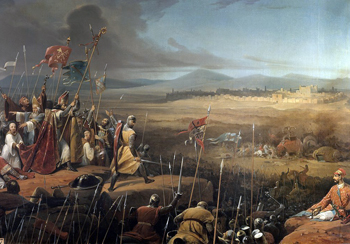 Thereupon, when the Emir who was guarding the citadel saw that Kerbogha and all the rest had fled from the field before the army of the Franks, he was greatly frightened. Immediately and with great haste he came before the standards of the Franks. ...
Thereupon, when the Emir who was guarding the citadel saw that Kerbogha and all the rest had fled from the field before the army of the Franks, he was greatly frightened. Immediately and with great haste he came before the standards of the Franks. ...
Then, he entered into an agreement with Bohemund that the pagans who wished to take up Christianity might remain with him (Bohemund), and that he should permit those who wished to go away to depart safe and without any hurt.
Bohemund agreed to all that the Emir demanded and straightway sent his servants into the citadel. Not many days after this, the Emir was baptized with those of his men who preferred to recognize Christ. But those who wished to adhere to their own laws, Lord Bohemund had conducted to the land of the Saracens.
This battle was fought on the fourth day before the Kalends of July, on the vigil of the Apostles Peter and Paul, in the reign of Our Lord Jesus Christ, who has honor and glory forever and ever. Amen. And after our enemies had now been completely conquered, we gave fitting thanks to God, Three and One, and the Highest.
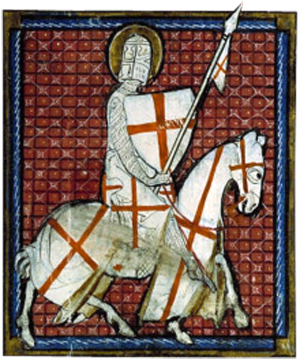
Continued
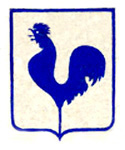
In his History of the Franks, eyewitness Raymond d'Aguiliers reports that not only did St. Andrew tell Peter Bartholomew where to find the Holy Lance, but he also instructed the Christians how they ought to conduct themselves before the battle and in the battle:

The Holy Lance carried into the Battle of Antioch, 1098
"When this has been done, begin battle in the name of the Lord by day or by night, as the judgment of the princes deems best, because the hand of God will be with you. If anyone has doubt of victory, let the gates be opened for him and let him go forth to fight the Turks, and he will see how their God will save him. Moreover, if anyone shall refuse to fight, let him be classed with Judas the betrayer of the Lord, who deserted the Apostles and sold his Lord to the Jews.
"Let them fight in the faith of St. Peter, holding in mind that God promised him that after the third day He would arise and appear to him, and for this reason also, because this land is justly St. Peter's and not the pagans.' And let your battle-cry be 'God help us!' and verily God will help you.
"All your brothers who died since the beginning of the expedition are present with you in this fight. You have only to storm the tenth part of the enemy, because they will assail nine parts in the might and command of God. And do not put off the battle because, if you do, the Lord will lead as many enemies from the other sides as you have on this side, and He will keep you shut up here until you devour one another [from hunger]."
The Battle of Antioch
The day of the fight was set for June 28. On that morning all partook of Communion and vowed to fight to the death for the glory of the Roman Church and the race of the Franks. The Holy Lance rode before them with the Bishop of Puy.

The Turks, large in number, lost heart and retreated
Another aid from Heaven was reported by Raymond d'Aguiliers in his Historia francorum qui ceperint Jerusalem (History of the Franks who took Jerusalem). He told about "a divine shower that Our Lord sent down upon all His army, little but full of blessing. All those touched by this water were filled with all grace and fortitude and, despising the enemy, rode forth no longer mindful of their hunger and weak state, but as if always nourished on the delicacies of Kings.
"This miracle also affected our horses no less. For what horse failed until the fight was over, even though it had tasted nothing except the bark or leaves of trees for eight days?"
He also reported that heavenly hosts entered the array, without, however, naming any specific Saints. He simply records: "God so multiplied our army that we, who before seemed fewer than the enemy, were in the battle more numerous than they."
In fact, the battle was brief and disastrous for the Turks who retreated in panic.
The Battle of Antioch as told in the Gesta Francorum
This excerpt about the defeat of Kerbogha comes from the Gesta Francorum, circa 1100-1101, written by an anonymous writer connected with Bohemund of Antioch.
At length, when the three days of fast had been fulfilled, and a procession had been held from one church to another, the crusaders confessed their sins, were absolved, and faithfully took the Communion of the Body and Blood of Christ; and when alms had been given they celebrated Mass.
Then, six battle lines were formed from the forces within the city:
- In the first line, that is at the very head, was Hugh the Great with the Franks and the Count of Flanders;
- In the second, Duke Godfrey with his army;
- In the third was Robert the Norman with his knights;
- In the fourth, carrying with him the Lance of the Savior, was the Bishop of Puy, together with his people and with the army of Raymond, Count of St. Gilles, who remained behind to watch the citadel for fear lest the Turks descend into the city;
- In the fifth line was Tancred, son of Marchisus, with his people;
- And in the sixth line was the wise man Bohemund, with his army.

The Christians and Muslims engaged in a fierce battle
After Kerbogha saw the lines of the Franks, so beautifully formed, coming out one after the other, he said: "Let them come out, that we may the better have them in our power!"
But after they were outside the city and Kerbogha saw the huge host of the Franks, he was greatly frightened. He straightway sent word to his Emir that if he saw a light burning at the head of the army, he should have the trumpets sounded for retreat, for this would be the sign that the Turks had lost the battle.
Kerbogha immediately began to retreat little by little toward the mountain, and our men followed them little by little. At length the Turks divided: One party went toward the sea and the rest halted at the mountain, expecting to enclose our men between them. As our men saw this, they did likewise.

St. George flanked by fellow warrior saints Demitrius and Mercurius
Other squadrons, moreover, were drawn out from the river to the mountain, which was about two miles distant. The squadrons began to go forth from both sides and to surround our men on all sides, hurling, shooting and wounding them.
Then, there came out from the mountains, also, countless armies with white horses, whose standards were all white. And so, when our leaders saw this army, they were entirely ignorant as to what it was and who they were, until they recognized the aid of Christ, whose leaders were St. George, Mercurius and Demetrius. This is to be believed, for many of our men saw it. [emphasis added] Then, when the Turks who were stationed on the side toward the sea saw that that they could hold out no longer, they set fire to the grass, so that, upon seeing it, those who were in the tents might flee. The latter, recognizing that signal as the sign of retreat, seized all the precious spoils and fled.
But, our men fought yet a while where the Turks greatest strength was, that is, in the region of their tents. Duke Godfrey, the Count of Flanders and Hugh the Great rode near the water, where the enemy's strength lay. These men, fortified by the Sign of the Cross, together attacked the enemy first. When the other lines saw this, they likewise attacked. The Turks and the Persians in their turn cried out.
Thereupon, we invoked the Living and True God and charged against them, and in the name of Jesus Christ and of the Holy Sepulchre we began the battle and, with God's aid, we overcame them. But the terrified Turks took to flight, and our men followed them to the tents. Thereupon, the knights of Christ chose rather to pursue them than to seek any spoils, and they pursued them even to the Iron Bridge, and then up to the fortress of Tancred.
The enemy, indeed, left their pavilions there, gold, silver and many ornaments, also sheep, cattle, horses, mules, camels, asses, grain, wine, butter and many other things which we needed. When the Armenians and Syrians who dwelt in those regions heard that we had overcome the Turks, they ran to the mountain to meet them and killed as many of them as they could catch. We, however, returned to the city with great joy and praised and blessed God, who gave the victory to His people.

Bohemond, Prince of Taranto, on a hill outside Antioch before the battle
Then, he entered into an agreement with Bohemund that the pagans who wished to take up Christianity might remain with him (Bohemund), and that he should permit those who wished to go away to depart safe and without any hurt.
Bohemund agreed to all that the Emir demanded and straightway sent his servants into the citadel. Not many days after this, the Emir was baptized with those of his men who preferred to recognize Christ. But those who wished to adhere to their own laws, Lord Bohemund had conducted to the land of the Saracens.
This battle was fought on the fourth day before the Kalends of July, on the vigil of the Apostles Peter and Paul, in the reign of Our Lord Jesus Christ, who has honor and glory forever and ever. Amen. And after our enemies had now been completely conquered, we gave fitting thanks to God, Three and One, and the Highest.

St. George as a Crusader
Continued

Adapted from August. C. Krey,
The First Crusade: The Accounts of Eyewitnesses and Participants,
Princeton: 1921, pp. 182-185.
Posted February 9, 2018
The First Crusade: The Accounts of Eyewitnesses and Participants,
Princeton: 1921, pp. 182-185.
Posted February 9, 2018






